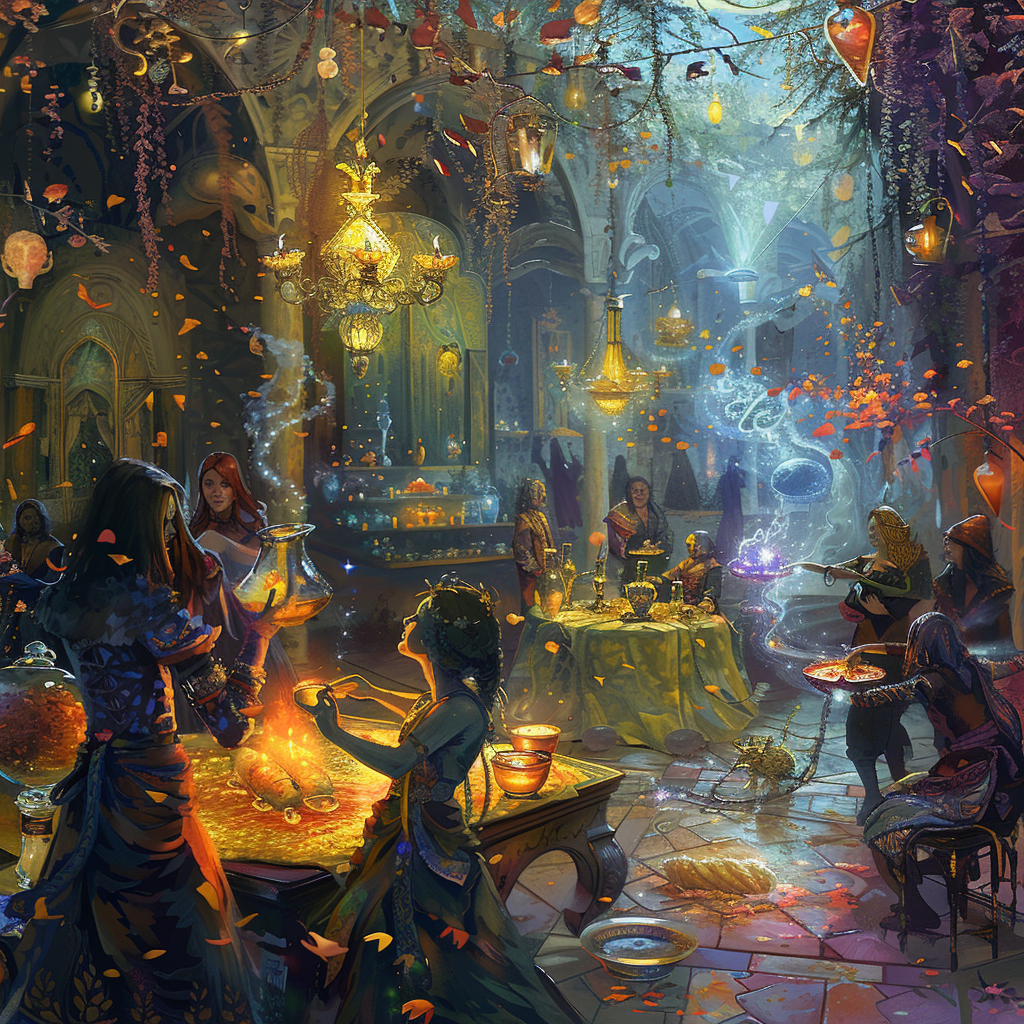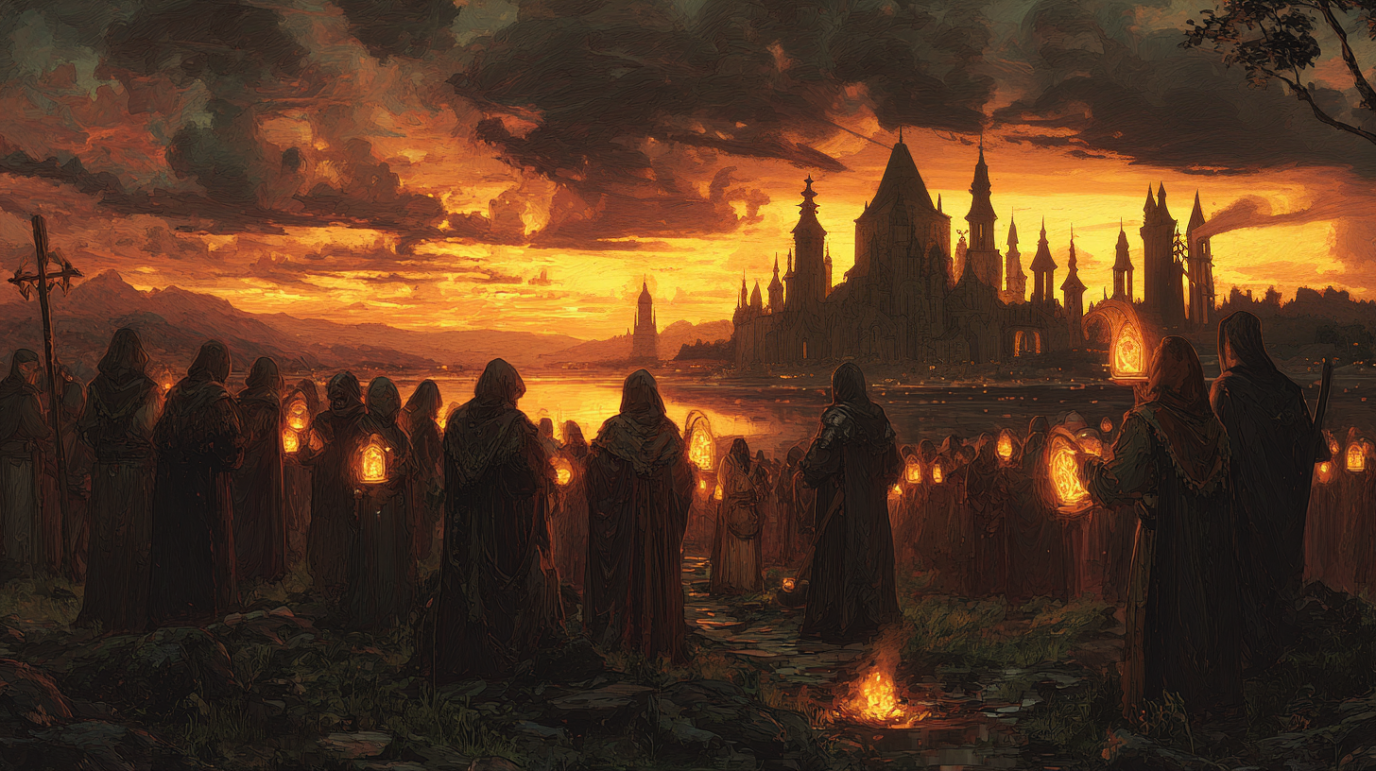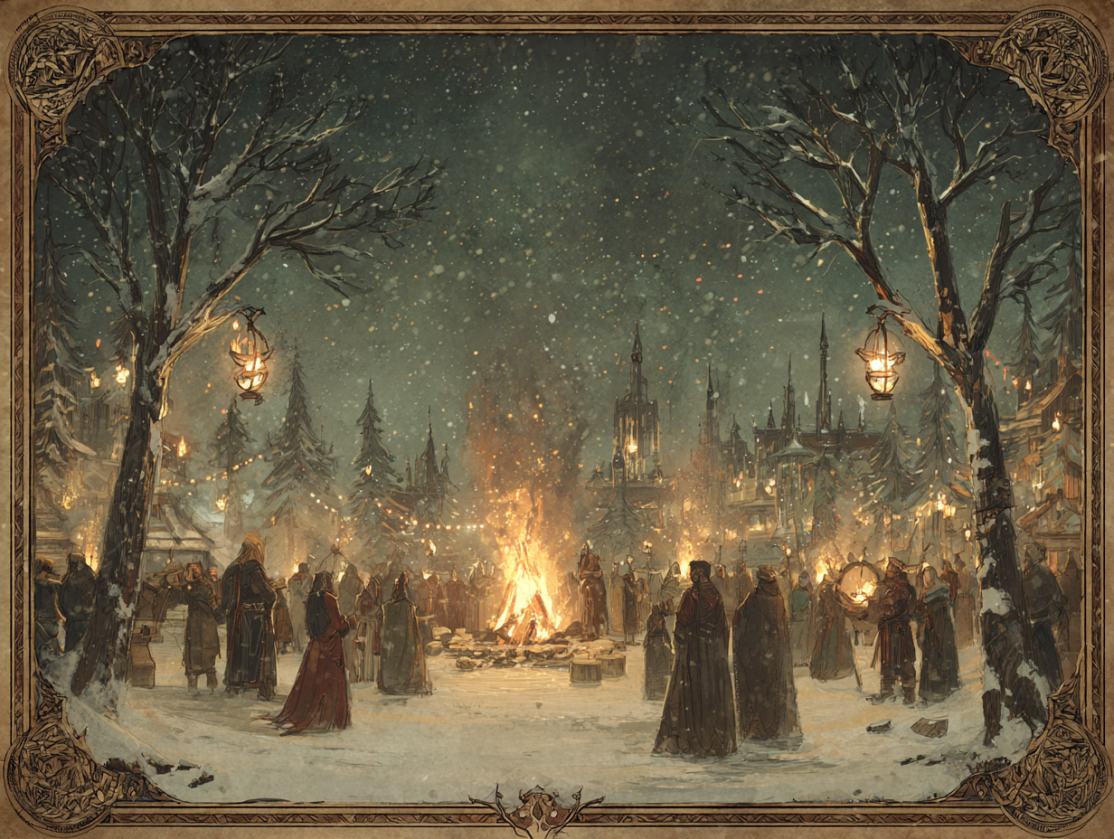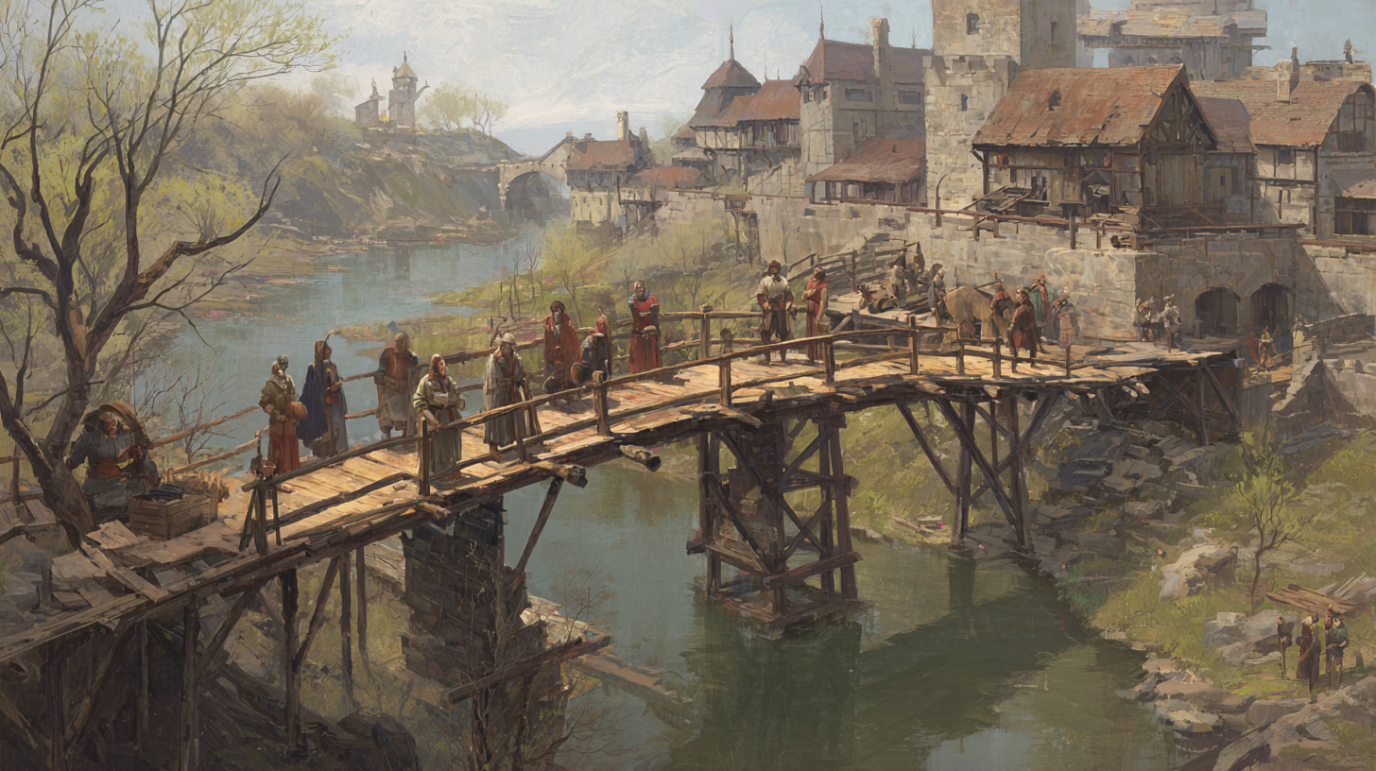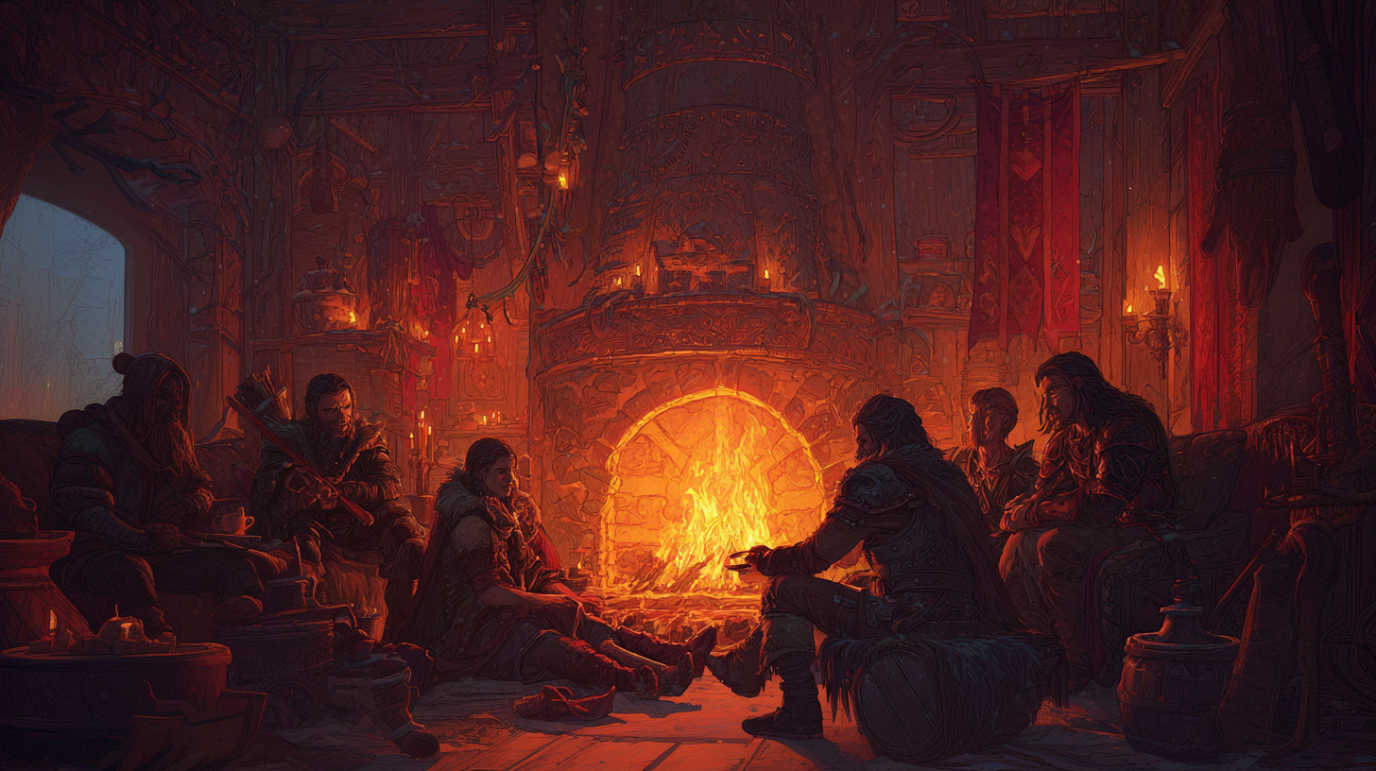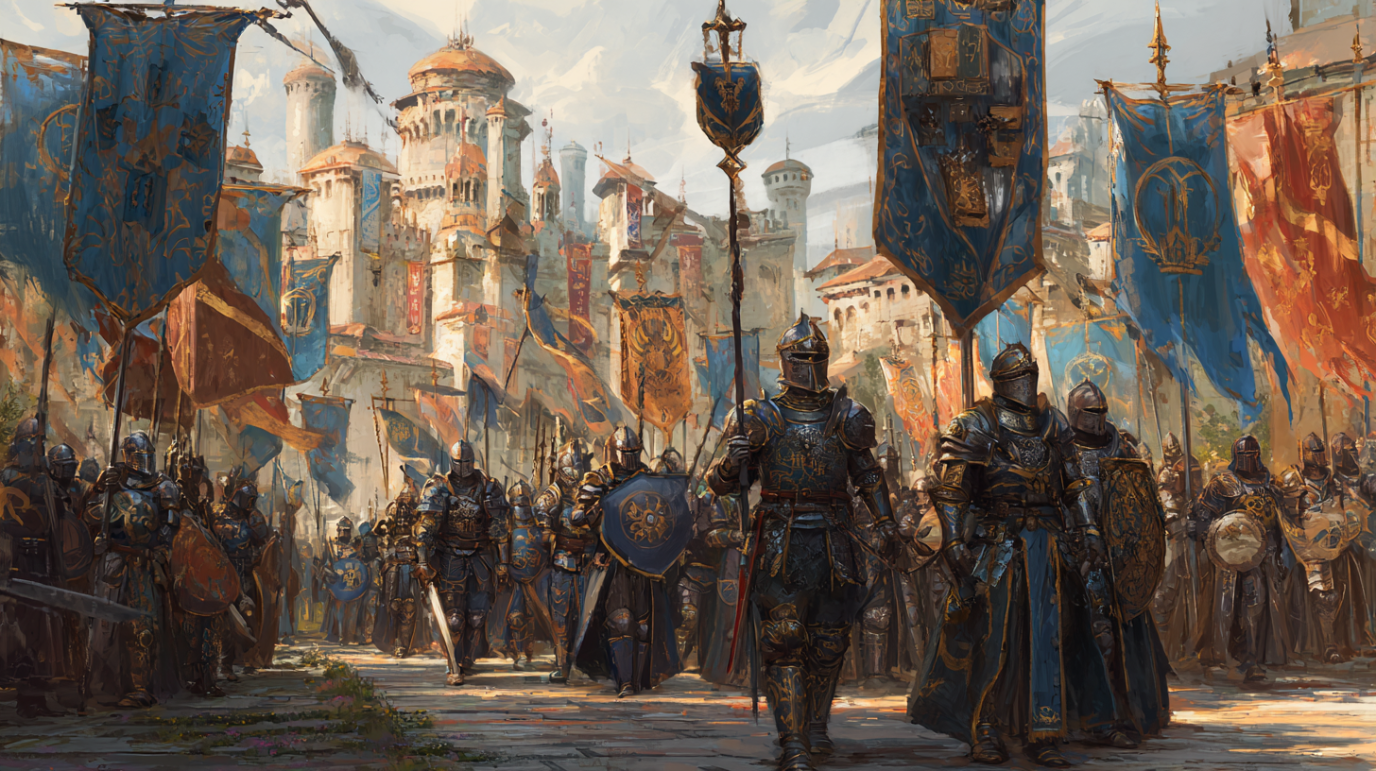The Calendar and Festivals of The Crescent
The calendar is a promise. Every festival marks not just time's passage, but proof that something worth celebrating will come again.
In The Crescent, people don't count days—they count toward gatherings. The merchant stocks ale three weeks before Mōrgal. The farmer plants knowing Wyrmbreak will need a harvest feast. Time here moves from one shared moment to the next, carrying communities through seasons that might otherwise break them apart.
The Turning Year
| Month | Season | Days |
|---|---|---|
| Wake | Spring | 28 |
| Brightmist | Spring | 28 |
| Stormtide | Spring | 28 |
| Sunfire | Summer | 28 |
| Crown | Summer | 28 |
| Goldfall | Fall | 28 |
| Ember | Fall | 28 |
| Starfall | Fall | 28 |
| Deep | Winter | 28 |
| Shiver | Winter | 28 |
Sacred Observances
Dawn Vigil
1st of Sunfire
Dawn Vigil is a summer religious observance honoring Solm, the faded god of light. Named after the knightly order that once served as his champions, the festival begins with candlelit gatherings at sunset and concludes with prayers at dawn.
The central ritual is the "Fading Light" ceremony, where participants light lanterns at sunset and keep them burning through the night. The few surviving knights of the Order of the Dawn—perhaps a hundred across The Crescent—lead memorial prayers when able, wearing their old armor despite its tarnished condition. Temple districts host formal observances, while taverns become gathering places for sharing stories of Solm's former glory.
The festival serves both as religious devotion for the faithful and cultural remembrance for those who honor the tradition without believing in its divine significance.
Surviving Dawn Knight
"We wear tarnished armor to honor a faded god. The vigil isn't for him anymore... it's for ourselves."
Mōrgal
15th of Deep
Mōrgal is the winter feast celebrating Mōrga, goddess of judgment and protection. The festival transforms the darkest nights into a time when normal social rules bend, allowing communities to address tensions through ritualized transgression rather than open conflict.
The main activities include masked feasts where people can speak freely without consequence, theatrical trials where communities playact their grievances with exaggerated drama, and gift exchanges that often carry pointed messages about debts or slights. The masks matter—behind them, the baker can tell the mayor exactly what he thinks, the merchant's wife can flirt with the blacksmith, and old grudges get aired in ways that somehow make them smaller.
The festival works because it provides controlled release for the pressures that build in close communities. By morning, people have said what needed saying, heard what needed hearing, and returned to their normal roles with tensions diffused rather than exploded. Mōrga's faithful consider this their most important observance, recognizing that sometimes you maintain order by temporarily suspending it.
Fenris Copperkettle, Tavern Keeper
"Mōrgal night, my tavern fills with masked strangers with familiar voices. People I've served for twenty years suddenly have opinions about everything. Come morning, they nod politely and order their usual ale."
Historical Remembrances
The Mend
15th of Wake
The Mend is a spring festival of communal repair work. Originally commemorating some ancient magical restoration—its exact nature now forgotten—the celebration has evolved into a practical community event focused on infrastructure maintenance.
Communities organize repair projects including bridge mending, debris clearing from winter storms, and opening of trade routes closed by weather. Dawn markets fill with craftsmen offering their services, and the sound of hammers and saws echoes through settlements all day. Citizens volunteer labor for public projects while hiring professionals for complex work.
By evening, the practical work transitions into celebration. Communities hold craft fairs displaying the day's repairs and improvements, followed by communal meals that celebrate both completed projects and ongoing functionality. The festival serves as both essential maintenance and community bonding, demonstrating collective capability in an uncertain world.
Winterwatch
22nd of Shiver
Winterwatch is a winter festival commemorating an ancient catastrophic magical storm. The original disaster has transformed into a celebration of warmth and community during the year's coldest period.
The festival features candlelight gatherings that extend deep into the night, late feasts when daylight barely reaches the world, and gift exchanges designed to provide warmth against winter's grip. Traditional participants attempt to stay awake until dawn "ends the watch," sharing stories and maintaining burning lights throughout the night, though most people eventually fall asleep despite their intentions.
The celebration provides essential social connection during winter isolation, offering communities a way to share resources and strengthen bonds when individual survival becomes challenging. Homes open to neighbors, food stores are pooled for communal feasts, and the gift exchanges often focus on practical winter necessities.
Wyrmbreak
21st of Goldfall
Wyrmbreak is the victory celebration commemorating The Crescent's triumph in the Tyrangor-Crescent War. The festival serves both as historical remembrance and contemporary military recruitment opportunity.
The celebration features military parades showcasing regional forces, alliance ceremonies renewing bonds between member cities, and victory feasts where veterans share war stories with civilian audiences. Military recruiters use the festivities to find eager prospects among young attendees, while political leaders deliver speeches emphasizing cooperative strength.
The festival carries particular significance as a reminder of successful regional unity. However, the celebration also highlights current political tensions—in taverns after the parades, older participants often express doubt about whether The Crescent's scattered cities could achieve such cooperation again. The contrast between historical achievement and present uncertainty gives the festival a bittersweet undertone.
Cultural Celebrations
Each people keeps their own celebrations. Mountain folk run craft competitions. River communities feast together during seasonal changes. Forest dwellers honor elemental spirits. City peoples showcase their latest innovations.
Most welcome observers from other cultures—good for trade, good for relations.
For specific traditions, see individual cultural guides.
Holiday Calendar Reference
| Date | Holiday | Type | Significance |
|---|---|---|---|
| 1st Wake | Homecoming | Cultural (Halfling) | Hearth spirits, community bonds |
| 15th Wake | The Mend | Historical | Spring renewal, community repair projects |
| 21st Wake | Rootmeet | Cultural (Primal Orc) | Elemental spirits, tribal gatherings |
| 21st Brightmist | Sparkfair | Cultural (Gnomish) | Innovation spirits, invention showcases |
| 7th Stormtide | Skyfell | Cultural (Drak'hai) | Freedom spirits, liberation reenactments |
| 1st Sunfire | Dawn Vigil | Religious (Solm) | Light's former glory, knightly order remembrance |
| 7th Crown | Hammerstrike | Cultural (Dwarven) | Craft spirits, masterwork competitions |
| 14th Goldfall | The Climb | Cultural (Human) | Ambition, achievement ceremonies |
| 21st Goldfall | Wyrmbreak | Historical | Tyrangor War victory, alliance ceremonies |
| 28th Ember | Deep Songs | Cultural (Duergar) | Forge spirits, magical innovations |
| 15th Deep | Mōrgal | Religious (Mōrga) | Community judgment, dispute resolution |
| 22nd Shiver | Winterwatch | Historical | Winter storm remembrance, cozy gatherings |
